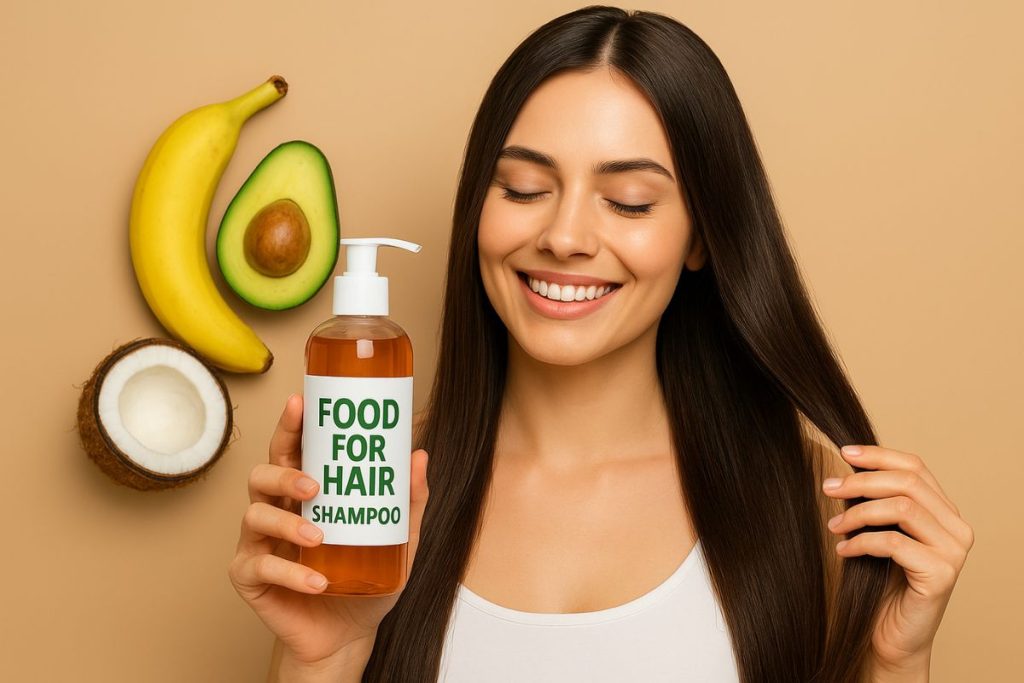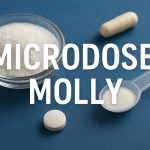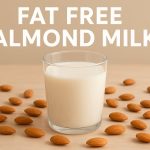Natural, organic hair care is booming as women seek alternatives to harsh chemicals. A new trend is Food for Hair Shampoo. These products use real food extracts and plant oils. For example, ingredients like coconut, banana, and avocado deliver vitamins, proteins, and antioxidants straight to each strand. This approach nourishes hair from the roots and merges cleansing with deep conditioning in one step. Each wash feels like a spa treatment for your hair.
Many people struggle with dry, brittle, or thinning hair. Harsh sulfates and chemicals in regular shampoos can strip moisture and damage hair. Food-based shampoos are different: they gently clean while replenishing nutrients. They bring vitamins and oils that strengthen and revive hair with every wash. Over time, hair becomes softer, stronger, and more vibrant because you’re feeding it healthy ingredients each time you shower.
What Is “Food for Hair Shampoo”?
The phrase Food for Hair Shampoo might sound like a slogan, but it describes a real concept: treating your hair like a growing plant that needs nourishment. These shampoos use edible extracts and oils (fruit pulps, seed oils, herbal blends) instead of just detergents. Essentially, a food shampoo mixes cleansing agents with conditioning nutrients, improving hair health over time.
For example, the Eveline Cosmetics “Food for Hair” line offers two such formulas. The Banana Care shampoo contains banana water and avocado extract, which add softness and structure. The Sweet Coconut shampoo includes coconut water and passion fruit oil to provide moisture and promote growth. These are literally shampoos that act like nourishing hair masks with every wash.
The key idea is to provide scalp nutrition with each cleanse. By cleaning and feeding hair at the same time, these shampoos aim to reduce breakage and boost volume. Early research and user reports note improvements in hair softness and fullness when switching to nutrient-rich shampoos. In other words, you’re adding vitamins and antioxidants to your hair routine. Healthier, well-nourished follicles support optimal growth, so over weeks of consistent use you should see stronger, thicker hair.
Natural Ingredients in Food for Hair Shampoos
Food-based shampoos often read like a recipe for a healthy smoothie, listing plant-based ingredients known to improve hair. Common “super foods” you’ll see on labels include:
- Banana Extract: Bananas contain silica and potassium that can enhance hair texture. Healthline notes banana’s silica helps collagen production, making hair stronger and shinier. A banana enriched shampoo softens hair and adds natural gloss, helping tame frizz and improve elasticity.
- Coconut Water & Oil: Coconut water is full of electrolytes and vitamins. It deeply hydrates the scalp and encourages thicker, stronger hair. Coconut oil acts as a sealing layer, locking in moisture to reduce breakage. Together, coconut ingredients leave hair soft, shiny, and well moisturized.
- Avocado Oil/Extract: Avocado is rich in healthy fats, vitamin E, and antioxidants. It moisturizes and strengthens hair. Avocado oil helps seal the hair’s cuticle and prevent breakage, while its vitamins nourish dry strands. In shampoo, avocado extract adds resilience and shine to weak, brittle hair.
- Papaya Extract: Papaya has the enzyme papain and vitamins A and C. These ingredients gently exfoliate and nourish the scalp. Antioxidants in papaya fight free radicals and may stimulate follicles. Research shows papaya compounds can promote hair growth. Papaya extract in shampoo helps condition the scalp and support healthy growth.
- Passion Fruit (Maracuja) Oil: This tropical oil is high in omega fatty acids and antioxidants. It strengthens hair and adds moisture. It also protects hair from environmental damage. Passion fruit oil in shampoo smooths hair and boosts shine, contributing to a healthier scalp and fuller hair.
- Macadamia Nut Oil: High in palmitoleic acid (omega 7) and other nutrients, macadamia oil mimics the skin’s natural oils. It penetrates deeply to fortify and smooth hair. Macadamia oil also contains antioxidants that help hair recover from pollutants. Especially for dry or curly hair, macadamia oil in shampoo restores manageability and lustre.
- Argan & Jojoba Oils: Argan oil (rich in vitamin E) restores moisture and protects hair from heat. Jojoba oil closely resembles scalp oil and can balance moisture. Both are used in gentle shampoos to nourish hair without greasiness.
- Herbs (Rosemary, Nettle, etc.): Some formulations add herbal extracts. Rosemary oil is known to improve circulation and stimulate hair follicles. Nettle and basil extracts provide minerals and vitamins that reinforce the scalp and hair.
- Green Tea Extract: Green tea (Camellia sinensis) is packed with antioxidants (like EGCG). It calms the scalp and may reduce hair loss by protecting follicles from damage.
- Tea Tree Oil: Used in small amounts, tea tree oil’s antifungal/antibacterial properties can help with dandruff and scalp health without harsh chemicals.
For instance, some shampoos combine banana and coconut to cover multiple needs in one wash. Others might blend avocado and macadamia for extra repair. Not every shampoo has all ingredients, but the best formulas mix several key foods to address different hair concerns.
By combining these food inspired components, shampoos deliver a nutrient boost with each use. It turns an ordinary wash into a supercharged treatment. Instead of feeling like a chemical process, hair washing becomes more like a nourishing ritual. The result is hair that feels clean, revitalized, and visibly stronger and shinier.
Benefits of Food-Based Shampoos for Growth & Thickness
Coconut oil is a superstar here, too. It deeply conditions each strand and helps lock in hydration. After using a coconut enriched shampoo, hair often feels incredibly smooth and looks lustrous, because the oil forms a protective coating against damage.
- Nourished, Stronger Strands: Plant nutrients infuse hair with vitamins and fatty acids. For example, vitamin E from avocado helps hair retain moisture, while the omega 7 in macadamia oil binds to the hair shaft for added strength. This can reduce breakage and split ends. Many users find their hair feels thicker and more resilient over time.
- Hydration & Softness: Ingredients like aloe, banana, and coconut deeply hydrate dry hair, making it softer and less frizzy. These natural cleansers usually don’t strip moisture like harsh sulfates do. After a few washes, hair often feels much smoother and more manageable.
- Enhanced Shine and Volume: Silica and antioxidants from foods give hair a healthy gloss. At the same time, soothing and stimulating ingredients support a fuller appearance. For instance, oils like peppermint or rosemary can increase circulation to the follicles (people sometimes feel a tingling!), which may momentarily plump each strand. Many users notice added volume and shine after switching to a food-based shampoo.
- Healthier Scalp: A balanced scalp is the foundation of good hair. Coconut and tea tree oils have anti-inflammatory and antifungal properties, which can soothe itching and flaking. Enzymes in papaya gently exfoliate dead skin cells. Keeping the scalp clean and nourished creates optimal conditions for hair to grow.
- Color Preservation: Many food shampoos include vitamins and mild acids that protect hair color. For example, the banana coconut shampoo mentioned earlier is formulated for color treated hair. Overall, hair that’s well nourished holds dye longer. These shampoos help maintain vibrancy by cleansing without harsh chemicals.
- Gentler, Cleaner Formulas: By avoiding sulfates, parabens, and synthetic dyes, these shampoos reduce irritation and damage. Gentler formulas mean less long term wear on hair. Many women report that after switching to a natural “hair food” shampoo, their hair feels stronger and healthier than when using conventional products.
In summary, these benefits help hair look and feel healthier over time. Consistent use of a nutrient rich shampoo essentially gives your hair a mini vitamin boost at each wash. The cumulative effect is thicker, shinier, and more resilient hair, and a scalp that is truly fed the nutrients it needs.
Choosing the Best Food for Hair Shampoo
With many products labeled “food for hair”, selecting the right one can be tricky. Keep these tips in mind:
- Read the Ingredient List: Look for whole-food extracts near the top. A true nutrient-rich shampoo will list things like coconut oil, fruit juices, or plant proteins before water or fillers. Avoid formulas where harsh detergents or alcohols dominate. The best food for hair shampoo will showcase recognizable nourishing ingredients, not just fragrance or colors.
- Check Certifications: Labels like USDA Organic, ECOCERT, or Leaping Bunny indicate quality sourcing and ethical production. A cruelty-free and paraben-free label is a good sign. Also look for shampoos with gentle pH formulas. A balanced pH helps maintain hair’s natural protective layer.
- Match Your Hair Type: Different food shampoos suit different needs. For thin, oily hair, a lighter formula (say, tea tree and lemon) can cleanse without weighing it down. For thick, dry hair, richer ingredients like cocoa butter or avocado are best. Some brands even split their lines e.g., a banana coconut blend for moisture vs. a protein rich soy wheat blend for strengthening. Choose one that addresses your main concern (volume, hydration, damage repair, etc.).
- Price vs. Value: Premium ingredients may cost more, but often deliver better results. Compare active ingredients and concentration. A more expensive shampoo with 90% natural content might outperform a cheaper one with only 10%. Read reviews: if a pricier shampoo noticeably improves hair quality, it may be worth it. Also consider size: a concentrated formula might use less per wash, saving money in the long run.
- Try Samples: If available, get travel sizes or sachets first. Watch how your hair responds over 2-3 weeks. Does it feel cleaner, softer, or fuller? Online reviews and beauty forums can help. Since many people post their experiences with these shampoos, look for before/after photos and detailed feedback. Word of mouth from friends is also useful if someone swears by a banana shampoo, it might be a good lead.
By following these steps, you can cut through marketing hype and find a truly nourishing shampoo. The goal is to choose one that actually makes your hair look and feel better, not just sound good on paper. When you find a shampoo where natural extracts outnumber the chemicals, that’s a strong sign you’ve found a real “food for hair” winner.
How to Use Food-Infused Shampoos for Best Results
Even the most nutritious shampoo needs proper use. Try these tips:
- Massage Gently: Apply the shampoo to wet hair and massage the scalp for 2-3 minutes. This improves blood flow and helps the nutrients absorb into the follicles.
- Rinse with Warm Water: Avoid hot water which can strip oils. Lukewarm water opens pores just enough to wash away dirt but keeps the natural oils.
- Don’t Overwash: Since these shampoos are gentle, you don’t need to shampoo daily. 2-3 times a week is usually enough. On off days, a simple rinse or using conditioner alone can keep hair fresh.
- Use a Rich Conditioner or Mask: Follow with a food-based conditioner or hair mask to seal in the benefits. Many lines have matching conditioner (for example, an avocado butter conditioner after an avocado shampoo). Occasionally, you can also apply a DIY mask (like mashed avocado or coconut oil) once a week for extra deep conditioning.
- Let It Sit: After lathering, let the shampoo sit on your scalp for a minute before rinsing. This gives the active ingredients time to work.
- Comb While Wet: Use a wide tooth comb when your hair has conditioner in it. This spreads the conditioner (and its nutrients) evenly and minimizes breakage.
- Protect After Washing: Consider leave in serums or oils containing similar ingredients (e.g., argan oil, coconut oil) to lock in moisture after towel drying.
Be consistent. Even the best shampoo takes time to show effects. Pairing it with a healthy diet and gentle styling habits will speed up results. Over a month or two, you should notice less breakage, better texture, and improved shine.
Foods to Support Hair Growth and Thickness
While topical care is key, diet matters too. Hair is made of keratin protein, so your body needs the right nutrients to build it. Make sure your diet is rich in these hair friendly foods:
- Eggs: Loaded with protein and biotin (Vitamin B7), which support keratin production. They also contain zinc and selenium. One study calls eggs one of the best foods for hair health.
- Leafy Greens (Spinach, Kale): Packed with iron, folate, and vitamins A and C. Iron helps red blood cells carry oxygen to your scalp, and Vitamin A helps skin glands produce sebum, a natural conditioner. Deficiency in iron is a common cause of hair loss, so greens are vital.
- Berries (Strawberries, Blueberries, etc.): High in Vitamin C and antioxidants. Vitamin C helps your body produce collagen (for hair strength) and aids iron absorption. Antioxidants protect follicles from free radical damage.
- Fatty Fish (Salmon, Mackerel, Sardines): Rich in omega 3 fatty acids and protein. Omega 3s support scalp health and growth. These fish also supply vitamin D and B12, which some studies link to healthier hair. One study found omega supplements reduced shedding and increased hair density.
- Sweet Potatoes: High in beta carotene (a precursor to Vitamin A). Vitamin A helps in cell growth and sebum production. A single medium sweet potato can provide more than your daily need of vitamin A, keeping hair healthy and shiny.
- Avocado: Loaded with vitamin E and healthy fats. Vitamin E is an antioxidant that protects the scalp’s oxygen carrying blood cells. In one study, people with hair loss saw 34.5% more growth after taking vitamin E for 8 months. The fats in avocado help lubricate and strengthen hair.
- Nuts and Seeds: Almonds, walnuts, and flaxseeds supply omega 3s, biotin, and vitamin E. Zinc in pumpkin seeds also supports scalp health. These nutrients fortify hair and keep it hydrated.
- Lean Meats & Beans: Provide iron and protein. Since hair is made of protein, adequate dietary protein (from chicken, turkey, lentils, beans) is crucial. Iron deficiency is linked to hair loss, so red meat, beans, and lentils help.
- Dairy or Calcium-rich Alternatives: Dairy products (or fortified plant milks) give calcium and vitamin D. Low vitamin D levels have been associated with hair thinning.
- Hydration: Don’t forget water. Hair shafts are about 25% water. Staying well hydrated prevents dryness and brittleness.
Eating a balanced diet full of these foods helps ensure your body has the materials to support hair growth. If you suspect a deficiency, it’s better to adjust your diet than rely on supplements. Paired with a food-based shampoo, this holistic “hair food” approach nourishes your hair both inside and out.
Frequently Asked Questions (FAQs)
- Q: What is food-based shampoo and how is it different?
A: Food-based shampoos are made with edible ingredients (fruits, herbs, oils) instead of mostly synthetic chemicals. A food shampoo cleanses and nourishes. For example, a banana shampoo not only cleans your hair but also gives it potassium and silica from bananas for shine. Think of it as a gentle wash plus a bit of a conditioning mask, leveraging nature’s nutrients. - Q: How does a food-infused shampoo help hair growth?
A: By supplying nutrients directly to your scalp. Ingredients like biotin, vitamins, and antioxidants create a healthier growth environment. Stronger follicles produce thicker strands. Many “food” ingredients also stimulate circulation peppermint oil, for instance, can tingle and wake up hair roots. Over time, well-nourished hair breaks less, making it appear fuller and longer. - Q: Are these shampoos safe for color-treated hair?
A: Yes. In fact, they can be gentler on dyed hair. Sulfates (in regular shampoos) often strip color, whereas food-based formulas usually avoid sulfates and include protective ingredients. For example, the banana-coconut shampoo mentioned earlier is designed for color-treated or damaged hair. Always look for “color safe” labels if your hair is dyed. Overall, the natural antioxidants help your color stay vibrant longer. - Q: What is the best food for hair shampoo?
A: The “best” shampoo depends on your hair needs. A top-rated food-based shampoo often combines multiple key extracts. For many, a blend of banana (for strength) and coconut (for moisture) works well. If you need extra repair, seek one with avocado or honey. Check that the formula has high concentrations of these extracts. Brands like Eveline or others specializing in natural hair care get good reviews. Reading user reviews or asking a stylist can also point you to a winner. - Q: How often should I use a food-enriched shampoo?
A: Usually 2-3 times a week is enough. These gentle shampoos cleanse well without stripping oils, so you won’t need daily washes. If your scalp gets oily quickly, you can rinse with water on other days. Consistency is more important than frequency: use it regularly over weeks to notice improvements. - Q: Can I make my own hair mask at home?
A: Absolutely! Many DIY masks use similar ingredients. For example, mix mashed avocado with a bit of olive oil, or banana with honey. Apply to damp hair for 20-30 minutes, then rinse and shampoo. These home remedies can boost hydration and shine. Just be sure to wash out any fruit thoroughly so no residue is left. These masks can complement your food-based shampoo for extra nourishment. - Q: Does a healthy diet really affect hair thickness?
A: Yes. Nutrient deficiencies often show up in hair. As Healthline notes, lacking vitamins B12, D, iron, or biotin can lead to hair loss. Conversely, eating protein-rich foods, fresh produce, and healthy fats supports thicker, healthier hair. Think of shampoo as external care and diet as internal care. Both need to work together for optimal hair health.
Each answer is concise and informative, aimed at answering common questions about using and choosing nutrient rich shampoos.
Conclusion
Food for Hair Shampoo represents a natural shift in hair care. By washing with shampoos packed full of fruit extracts, plant oils, and botanical nutrients, you literally feed your hair from the outside in. As we’ve seen, ingredients like banana, coconut, and avocado act as hair vitamins, leading to stronger, shinier strands and a healthier scalp. Pairing a high quality food infused shampoo with a balanced diet gives your hair the ultimate nutrition boost.
The market reflects this trend: the global natural hair care industry is now worth over $10 billion. If you’re looking for genuinely organic haircare, trying a food-based shampoo is a great place to start. Its gentle, nutrient rich formula can transform dull, weak hair into vibrant, resilient hair over time.
Ready to treat your hair to a nourishing makeover? Share this article with someone who loves DIY hair care, and drop a comment below with your favorite “hair food” tip. The more we share, the more beautiful our hair will become with nature’s help.
Previous Post: Kids Knee Brace, Foot Growth Pregnancy, Exercise Pulleys, Health Benefits of Cumaseba






